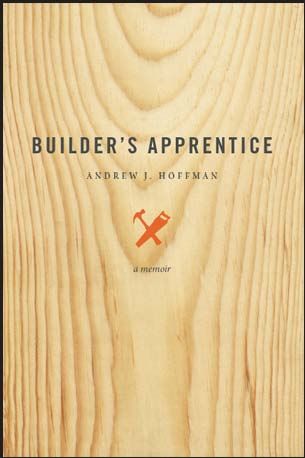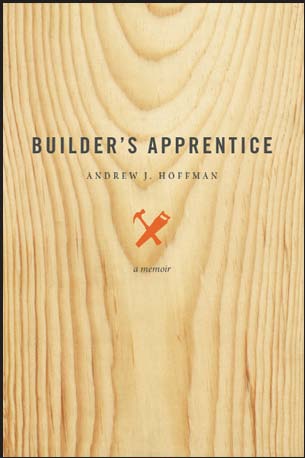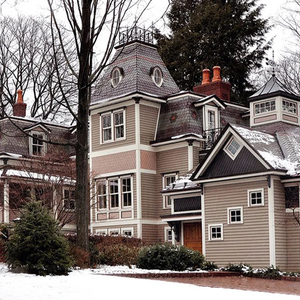Choosing a Hammer Over Harvard

In 1985, Andy Hoffman had a degree in chemical engineering and a job working for the EPA in Boston. He also had letters of acceptance to graduate school from Harvard and Berkeley. What to do? What to do?
Hoffman decided to answer an ad in the Boston Globe that said, “Carpenters needed on Nantucket.” He had no tools, no truck, and no experience. On the phone, the builder told Hoffman that he would have to fly out to the island for an interview. “I’ll pick you up at the airport,” he said. “I’ll be in a black Blazer.” Hoffman got off the plane looking for a guy in a dark sport coat with gold buttons.
He got the job. And four years later, Hoffman was the project manager on the construction of 29,000-sq.-ft. mansion in Fairfield County, Connecticut. In his new memoir Builder’s Apprentice, Hoffman tells the story of how all of this came about, why it happened, and how it changed him. It is an unlikely story. And then again, it isn’t.
Hoffman came along at the tail end of a whole generation of builders, myself included, who took up the trade not by default, not because our fathers had been builders, or because we could find nothing else to do, but by choice. Many of us went to college. Some graduated; some didn’t. Some tried the corporate world; others knew without trying that it wasn’t right for them.
We liked working with our hands. We liked the camaraderie of job sites. We liked testing ourselves against the elements. We liked fitting pieces of wood together so tightly that you couldn’t slip a piece of paper between them. We liked the satisfaction at the end of a day of seeing walls and a roof where none had stood that morning.
And so we became house carpenters, not plumbers or electricians, not masons or roofers, not painters or tilesetters, but carpenters. We were the sculptors, the ones who shaped the building with studs and rafters, and then decorated it inside and out with our trim. And we did this not for the money (because there wasn’t much of that) and not for the prestige (because there was even less of that); we did this because of how it made us feel. It was deeply satisfying in a way fewer and fewer people seem to understand today.
Hoffman’s memoir does a fine job of articulating what drove many of us to become builders. And while his story may not be unique, it is compelling. He gets the details right, capturing the sweat, the sawdust, and the satisfactions of a job site. More than anything, though, Hoffman nails the odd cast of characters-sometimes tragic, sometimes heroic-who inhabit the world of construction.
My only complaint is that Hoffman unabashedly worships huge, ostentatious houses. Although the book is set in the 1980s and truthfully captures the conspicuous consumption of that decade, it is being published at time when the country, the culture, and in particular, the audience for this book are in a very different place. The lack of reflection about the environmental (and ethical) issues surrounding such houses seems particularly strange given that Hoffman now teaches about sustainability, the environment, and natural resources at the University of Michigan.
But that’s a quibble. Builder’s Apprentice was not meant as a commentary on America’s houses, and it’s not an argument for building mansions. If anything, it’s an argument for the road less traveled. Giving up Harvard Graduate School to swing a hammer may not have garnered Hoffman any initials to list after his name, but it taught him one of life’s most valuable lessons: how to trust himself.
Fine Homebuilding Recommended Products
Fine Homebuilding receives a commission for items purchased through links on this site, including Amazon Associates and other affiliate advertising programs.

Affordable IR Camera

8067 All-Weather Flashing Tape

Reliable Crimp Connectors

The Builder's Apprentice, by Andrew Hoffman, is published by Huron River Press.
























View Comments
Enjoyed this book immensely... Few people pass up the status of a Harvard degree and access to social circles a 'professional' job provides, in order to follow one's heart to a career that is unknown... a career you believe is your true passion, but which is completely different from your parents' expected path for you. This is a well-written personal story that will inspire those looking to redefine their careers or take a big career changing risk...
In our consumerist society, where stature is all too often determined by the cars one has in their garrage, its refreshing to read the story of one who followed their passion rather than the lemmings. If your trying to figure out your own path, or if you just want to read a touching and insightful story get a copy today.
Kevin, I'm glad to read your description of the generation of carpenters who chose that path. I'm one of them, as you know, but during my pre-FHB carpentry career in NJ, I only encountered a few others. Yet they seem to be thick as black flies in May here in New England. What's up with that?
In any event, I plan to read Builder's Apprentice based on your review. I'd also love to hear your take on Shop Class as Soulcraft.
Hi Kevin,
Thanks for posting up this review. I'm putting the book in my Amazon cart to add to my next order. Woodworking or carpentry memoirs are a favorite of mine. Sometimes in the thick of things it's easy to lose perspective on why we chose to do what we do. These books can help us laugh at ourselves and the situations this work can put us in, too.
Here are a couple of my other favorites:
Toil: Building Yourself, by Jody Proctor
Hammer: Poems by Mark Turpin
Tools of the Trade by Jeff Taylor
and of course, House by Tracy Kidder
- Kit
Great review! I'll have to pick up that book. Andy is right, too, Kevin. If you haven't read Shop Craft as Soulcraft, you should. There's a good video interview of Matthew Crawford, too, it starts at around the 4th minute (4.00). For all of us with graduate degrees and tool belts.
Gary